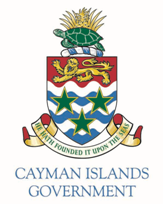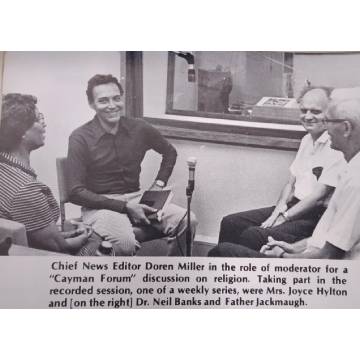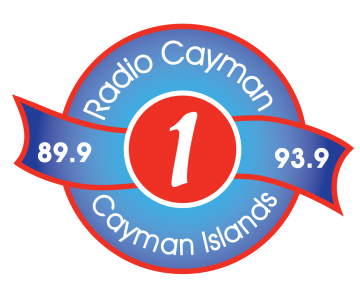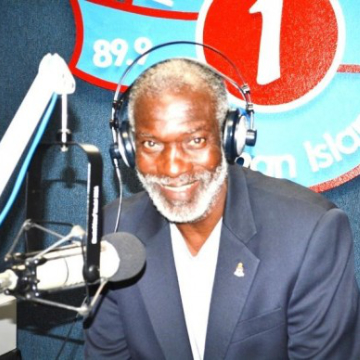News
MRCU Aerial Operations Set to Resume as Mosquito Complaints Increase

Following growing concerns and a slight increase in the number of complaints from the community about the high abundance of mosquitoes, the Ministry of Health & Wellness and the Mosquito Research & Control Unit (MRCU) would like to offer clarity on the current situation and how MRCU is addressing it.
“So far, in 2023 there have been three large mosquito emergences. The most significant mosquito emergence occurred on 20th February and saw an average trap catch of 277 mosquitoes. The emergence on the 27th March saw an average of 214 mosquitoes per trap. The current emergence has so far peaked at an average of 132 mosquitoes per trap. It is expected to increase further over the next few days as more mosquitoes emerge,” explains Dr. Alan Wheeler, Director of the MRCU.
While there has been some heavy rainfall in April, Dr. Wheeler explains that the current mosquito emergence is due to high tides. “Any tide that is above 30cm will cause flooding of the mangrove areas. On 6th April, the tide rose above this level and increased gradually until it reached a peak of 64cm on the 19th April. This is the highest-ever tide recorded by MRCU. The result of this extended high tide has been to hatch mosquito eggs that have remained dormant for many years,” Dr. Wheeler adds.
MRCU insecticide applications are conducted based on a daily evaluation of the mosquito situation, not on a set schedule. Since the onset of the current mosquito emergence on 13th April, MRCU has conducted 40 separate ground ULV control missions across Grand Cayman and treated a total of 68,143 acres.
MRCU has been unable to conduct any aerial operations since April 14th due to a necessary repair being discovered during weekly inspection of one of its aircrafts. The necessary technical experts are on island working to resolve the problem, and it is expected that the aircraft should return to service by mid next week. MRCU’s second aircraft is currently undergoing its required annual inspection and not available until this is completed in about one month’s time.
“We have also received inquiries about the personnel capacity of MRCU’s aerial operations unit,” explains Ms. Nellie Pouchie, Chief Officer for the Ministry of Health & Wellness. “MRCU currently has 1 full-time pilot, and is looking to fill the vacancy for a second pilot in order to ensure that aerial operations are properly resourced. Recruitment of an additional pilot is currently underway,” CO Pouchie adds.
It is important to note that MRCU’s aerial operations unit is actually quite unique. While the unit is primarily used to support MRCU’s operation, it is also a part of other potential support services, such as the Fire Service, should there ever be a need aerial assistance for any of their operations.
“Given the demands of the post, the proximity which the aircraft flies in residential areas, and the modifications of the airplane to ensure that it meets the changing needs of MRCU’s control operations, this post requires an experienced pilot, so recruiting the person with the necessary skills takes time,” CO Pouchie emphasises.
The Ministry is working closely with MRCU in an effort to help educate both residents and stayover visitors of MRCU’s aerial operations in light of complaints that have been received about the flights.
“Our aerial operations for MRCU fall into two general categories: adulticiding and larviciding,” explains Ben Tresidder, MRCU’s aerial applications Acting Chief Pilot. “Adulticiding, utilizing (ULV) ultra-low-volume liquid targets flying mosquitoes that are looking for a blood meal, and thus due to the activity period of the insect generally take place in the evenings. Larvaciding operations, by contrast, are generally granular applications that target mosquito larvae, with the aim of preventing them from developing to become flying mosquitoes. For safety reasons these larviciding operations take place during the hours of daylight. Adulticiding and larviciding involve differing aerial application techniques. One noticeable difference is that whereas adulticiding operations may mean a single pass over a particular area, larvaciding operations often require several passes in the same vicinity and may mean that our aircraft ‘lingers’ for an extended period of time,” Mr. Tresidder adds.
“Both the Ministry and MRCU look forward to having aerial operations resume as soon as possible next week and apologises for the current necessary inconvenience,” CO Pouchie states.
MRCU’s aerial and ground operations are essential to prevent the transmission of mosquito related illnesses in the Cayman Islands. To date, there have been no reported cases of mosquito related illnesses in Cayman in 2023, and MRCU's work is pivotal in this prevention work.
The Ministry, MRCU and the Public Health Department would like to remind the public to continue safety practices when outside during the peak mosquito hours (sunrise and sunset). This includes wearing long sleeve clothing and utilising your mosquito repellent while outdoors. Mosquito repellant containing 50% DEET can also be used when outside during peak hours for added protection.
Additionally, the community is reminded to drain still water in outdoor receptacles (tyres, containers, flower pots, etc) to prevent mosquito breeding, and to ensure doors and window remain closed if they are not screened.
The public is also encouraged to contact the MRCU, for more information or to file a mosquito related complaint, on 949-2557.












